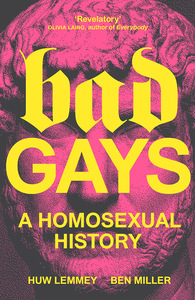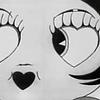Take a photo of a barcode or cover
I was honestly so excited to read this but...
The title, subtitle, introduction, main body, and conclusions all were attempting to be completely different things??
It's a good book if you just want to find out about famous gay people who did bad things/contributed to darker aspects of history.
But its not a homosexual history as much as it is a history of major world events in which some people involved were gay.
The title, subtitle, introduction, main body, and conclusions all were attempting to be completely different things??
It's a good book if you just want to find out about famous gay people who did bad things/contributed to darker aspects of history.
But its not a homosexual history as much as it is a history of major world events in which some people involved were gay.
challenging
informative
reflective
They also ask us to pose the question of the whole notion of gay heroes: why do we choose to remember, and why do we choose to forget?
Really entertaining! While I agree with some reviews that the book doesn't come together very cohesively as a whole, and it's very obvious that it started off as a podcast that discussed one person per episode, and that has now been transformed into a chapter by chapter project... idk, I still really liked this. Each individual chapter gave a fascinating summary and profile and interesting titbits about a queer person from history, and in a lot of cases, left me with a desire to read up on them more. (I feel like there's so much more to learn about Roger Casement and Margaret Mead and Yukio Mishima in particular. Also how is this the first time I learned that J. Edgar Hoover was gay?? Did I know, and somehow forget?? LOL.) And I mean, clearly, a lot of these people have nothing in common, and clearly, a lot of them are much worse than others. If you're reading this book hoping to get a clear thread connecting each person to the next, you're going to be disappointed. (I don't even know if that's what the authors intended to do, and if it was their intention, I can't say they succeeded.) They do add some sprinklings of their personal theories and politics and interpretation, which I did find satisfying. The writing style is loosely academic, casual with moments of humour that I enjoyed. And it was all pretty digestible; perhaps there were a few chapters where the subject matter wasn't quite as interesting, but none of it went over my head.
Listened to the audiobook as read by Ben Miller, which was quite good! Narrating non-fiction is a skill in and of itself, and this narrator was really easy to listen to, and had one of those universally pleasing voices. The production could have used some work, because there were more than a few instances of repeated lines, or moments where the narrator had recorded an alternate reading of a line, and it was left in. A little bit sloppy, perhaps, but it didn't actually bug me. I do wish that this had been a bit more expansive and diverse (surely there were a couple evil dykes we could have squeezed in here) but the book doesn't claim to be all encompassing, so that doesn't feel like a fair critique. I enjoyed this for what it was, and hopefully I can do some further reading soon.
TLDR: premise was interesting but the writing was not engaging and lacked nuance
I read one review that stated that this book was like being told you get to learn really interesting stuff at school only to find out that it’s written and discussed in a really dull way (at times felt v high school history lesson but on gay people, with limited critical appraisal and discussion of context). It was a push to read all 300 pages as the premise (that we should learn from gays who did bad things) was not clear in most chapters (Other than the chapters were they turned out to be nazis). A lot of the time it felt like the writers were saying that that these people were bad for being overt about their sexuality, rather than actually critiquing their problematic behaviours. This was particularly evident in the pre 20th century case studies.
That said, I did really enjoy the chapters on Margaret Mead, J Edgar Hoover and Pim Fortuyn.
I read one review that stated that this book was like being told you get to learn really interesting stuff at school only to find out that it’s written and discussed in a really dull way (at times felt v high school history lesson but on gay people, with limited critical appraisal and discussion of context). It was a push to read all 300 pages as the premise (that we should learn from gays who did bad things) was not clear in most chapters (Other than the chapters were they turned out to be nazis). A lot of the time it felt like the writers were saying that that these people were bad for being overt about their sexuality, rather than actually critiquing their problematic behaviours. This was particularly evident in the pre 20th century case studies.
That said, I did really enjoy the chapters on Margaret Mead, J Edgar Hoover and Pim Fortuyn.
Are any of these gays actually that bad? I was expecting conquerers, murders, and thieves but we just get some guys who made some questionable decisions and pushed against the societal norms at the time. These people weren’t exactly immoral but actually rather progressive. Exploring more so how same-sex relationships were perceived rather than the actions of the actual person.
It’s a really interesting investigation about the gay identity and how it has shifted over time and how society has responded to it in different time periods but the book is also written so boringly? It’s well researched but reads like a student thesis where they just shoving words and information (that sometimes barely has to do with the subject) to reach a word-count. Also only has 1 lesbian and one non-white/non-european person.
Maybe I just need to read more educational non-fiction but this was a rough one to get through.
It’s a really interesting investigation about the gay identity and how it has shifted over time and how society has responded to it in different time periods but the book is also written so boringly? It’s well researched but reads like a student thesis where they just shoving words and information (that sometimes barely has to do with the subject) to reach a word-count. Also only has 1 lesbian and one non-white/non-european person.
Maybe I just need to read more educational non-fiction but this was a rough one to get through.
Intriguing, I ended up enjoying it as a whole but there were some parts that dragged...
if the pretty cover and title tricks you into thinking this book is going to be super fun, please know you are going to LEARN today. can't wait to drop some knowledge about the political landscape of the Netherlands post-9/11 on my befuddled wife.
informative
reflective
medium-paced
Bad Gays is a must read for anyone interested in queer history and changing attitudes to sexuality over the last 2000 years.
The books profiles some terrible people in history who had same sex relationships from Hadrian to James I to Roy Cohn to explore how their contemporary contexts treated homosexuality and how it has been linked to power, nationalism, fascism and a war-like masculinity, debunking liberal ideas of a straight line from past persecution to current liberation, and of a coherent universal queer identity.
Super interesting and delightfully bitchy at times, Bad Gays is an illuminating and entertaining read that challenges reductive representational politics (diversity win! The gangster extorting money from you loves a twink-filled orgy! etc) and sheds light on the many meanings that queer sexual behaviours and identities have represented through time.
The books profiles some terrible people in history who had same sex relationships from Hadrian to James I to Roy Cohn to explore how their contemporary contexts treated homosexuality and how it has been linked to power, nationalism, fascism and a war-like masculinity, debunking liberal ideas of a straight line from past persecution to current liberation, and of a coherent universal queer identity.
Super interesting and delightfully bitchy at times, Bad Gays is an illuminating and entertaining read that challenges reductive representational politics (diversity win! The gangster extorting money from you loves a twink-filled orgy! etc) and sheds light on the many meanings that queer sexual behaviours and identities have represented through time.




